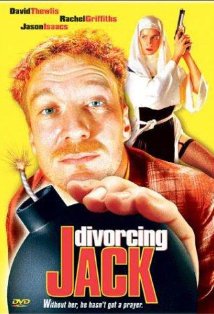Here are a few more Northern films to enjoy, available via the Internet, DVD, or if you’re lucky to catch them at the right time, a showing at the Queen’s Film Theatre in Belfast.
Cherrybomb (2009)
Released on DVD in the UK and soon to be released in the United States, Cherrybomb is young modern Belfast at its most accidental-chic. In crime noir style, this sometimes harrowing, sometimes beautiful film was written by Daragh Carville (Middletown) and co-directed by Lisa Barros D’Sa and Glenn Leyburn.
The tagline—“Two guys. One girl. Game on.”—gives us advance warning that this is a film of young madness—crazy dares and violent outcomes. The wheel starts to spin after Malachy (Rupert Grint) meets Michelle (Kimberley Nixon), who has just returned to Belfast from London with her father, powerfully played by James Nesbitt. Michelle challenges Malachy and best mate Luke (Robert Sheehan) to compete for her affection in increasingly dangerous ways.
It starts out as a child’s game: at first Michelle only chants “Eeeny, meeny, miny, mo” at the boys when they ask her to choose between them. But the game soon develops into a dizzying kaleidoscope of fighting, joyriding, vandalizing, and worse.
Quick dialogue, delivered with real and unpolished intensity from the cast, spurs on both the physical action and the fast pace. An intimate look at one of the psychological places that Belfast, in its new prosperity and raw energy, has been headed over the past ten years, Cherrybomb is as much a visual explosion of color and energy as it is a classic morality play.
Divorcing Jack (1998)
“I sat and thought of lovely Margaret, of her hair and her eyes and her laugh and the way she kissed me . . . . She had died in my arms. What would she think of me now? Would she still want me now that I had pushed her mother down the stairs and broken her neck?”
Popular Northern Irish novelist Colin Bateman penned the screenplay for the film based on his first novel, Divorcing Jack. The story was one of his first forays into the dark romantic comedy/thriller genre that has since become his trademark. A former newspaper reporter, Bateman has based a number of his tragicomic lead characters on himself, and this story is no exception, full of dark Belfast wit and quick comebacks.
Dan Starkey, played with perfect Northern-man quirkiness by David Thewliss, is a Belfast newspaper columnist who drunkenly falls for the wrong woman one day, unwittingly enacting a chain of events that soon have him mired in murder and a political cover-up. Pursued by paramilitary thugs, he embarks on a race to find the killer before the murder is pinned on him.
On the way he meets an American journalist (Richard Gant), a beautiful stripper (Rachel Griffiths, disguised as a gun-wielding nun), crooked politicians, and evil crooks. Dan—disguised at one point in a woman’s blonde wig—accidentally uncovers a story so scandalous it could upset Northern Ireland’s upcoming election—and seriously derail the Northern peace process, a very new idea in the late ‘90s.
Directed by David McCaffrey at an energetic comic pace, the film has plenty of sharp character acting and an intelligent script that give it a style similar to Trainspotting and Pulp Fiction, the cast of which also included Bronagh Gallagher (The Commitments), here playing a very funny Belfast cab driver.

Due to their violent content, none of these films are suitable for children under 17. But for adults, they can vary from fun thriller to intelligent, even poetic Northern journeys. They are also cultural excursions; helpful for anyone wishing to understand Northern Irish life and culture, past and present.
Click through to read the first part of this series, Northern Irish Film - Top Picks: Middletown, Hunger, and Bloody Sunday
- Caroline Oceana Ryan
Author, AN OLD CASTLE STANDING ON A FORD: One Yank’s Life in an Almost Peaceful Belfast (Eloquent Books, 2010)
